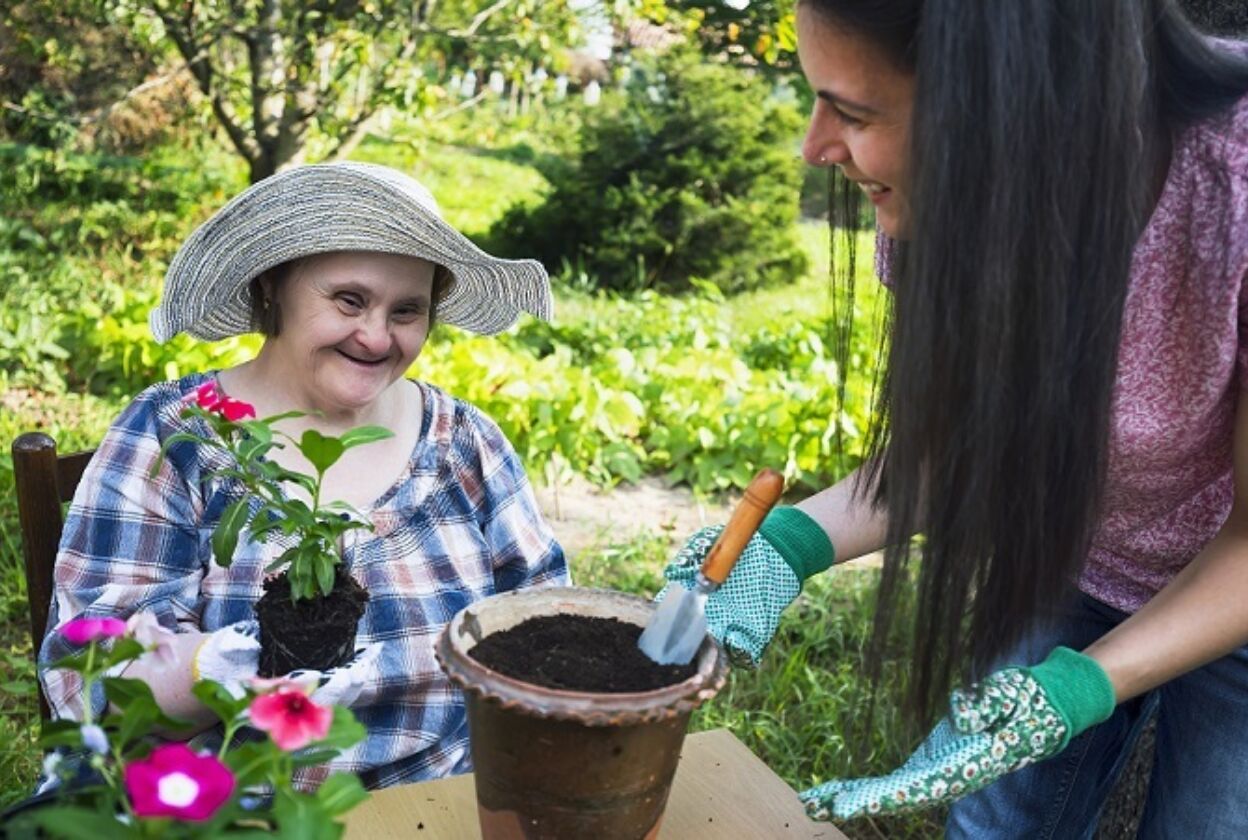Why we need more people with disability in leadership
Emma Olivier is determined to move the dial on disability inclusion and see people with disability lead in every corner of our society.


Social and community participation refers to the active involvement of individuals within their communities and broader society. It encompasses various forms of engagement, such as volunteering, attending community events, joining clubs or organisations, and interacting with neighbours and fellow citizens. Essentially, it involves individuals contributing their time, skills, and resources to enhance the well-being and cohesion of their community.
Social and community participation plays a pivotal role in fostering vibrant, inclusive, and resilient societies. It serves as a foundation for building strong social bonds and a sense of belonging among individuals. When people actively participate in their communities, they not only contribute to the betterment of society but also benefit personally through increased social support, improved mental well-being, and a deeper understanding of the challenges and opportunities within their community. Additionally, community engagement often leads to collaborative efforts that address local issues, promote civic responsibility, and drive positive change on a broader scale.
The importance of social and community participation cannot be overstated. It serves as a linchpin for the overall well-being and sustainability of communities and societies. Active participation leads to more informed and empowered citizens who are better equipped to address issues like social inequality, environmental concerns, and public health challenges. Furthermore, it fosters a sense of connectedness and solidarity among diverse groups, helping to bridge gaps and reduce social divisions. As we navigate complex global issues, the ability of individuals to come together and actively engage in their communities becomes increasingly crucial for shaping a brighter and more equitable future. If you need assistance with social and community participation then contact us now.
Community participation is an important part of a healthy and fair society. When people take part in their community, everyone benefits. It helps people feel included, builds stronger connections, and makes sure everyone’s voice is heard in decision-making. Here are four key reasons why participation matters:
Taking part in community activities helps people feel accepted and valued. It gives everyone a chance to join in, no matter their background or ability. For example, local councils often run social clubs or community events where people can meet new friends, share experiences, and feel part of something bigger.
When more people get involved, decisions become fairer and more effective. Local councils, schools, and neighbourhood groups often ask for community input before making changes. This helps make sure decisions reflect what people really need and want.
Working together builds trust between people and organisations. When community members and local groups such as NGOs or volunteer teams cooperate, they learn to understand each other’s views and support one another. This teamwork makes the community stronger and more united.
Community participation helps everyone take responsibility for the place they live in. When people help with projects like clean-up drives, tree planting, or safety programs, they make a positive difference. This shared effort leads to long-term progress and a better quality of life for everyone.
Being part of your community has many benefits. It helps people grow personally, connects them socially, and even supports better use of resources and development. Here are some of the main benefits of community participation:
When people get involved, they build confidence and learn new skills. Taking part in local events or projects can help individuals develop leadership, communication, and teamwork abilities. It also provides a great way to form friendships and strengthen social connections. For example, volunteering at a community centre or joining a local club can improve self-esteem and create a sense of purpose.
Community participation helps create stronger and more supportive communities. When people work together, they learn to understand and respect each other’s differences. This teamwork promotes social harmony and makes it easier to solve shared problems like safety, health, or environmental issues. A connected community is more likely to help each other during times of need.
When communities participate in local projects, resources are used more wisely. For example, involving residents in town planning or budgeting helps make sure money is spent on what really matters. Participation also encourages sustainable development because people care more about maintaining and improving their surroundings when they’ve had a hand in shaping them.
Social participation means being part of your community and taking part in activities that bring people together. It helps people make friends, learn new skills, and feel included. Here are some detailed examples:
1. Volunteering in the community
People can give their time to help others. For example, volunteering at food banks, animal shelters, local events, or aged care homes. It is a great way to meet people and make a positive difference.
2. Joining clubs and hobby groups
Many communities have sports clubs, gardening groups, art or music classes, and book clubs. These activities help people stay active, build friendships, and share common interests.
3. Taking part in local events
Festivals, fairs, fundraisers, and community BBQs bring people together. Attending or helping to organise these events builds community spirit and makes everyone feel part of something bigger.
4. Supporting local causes
People can get involved in projects that protect the environment, support people with disabilities, or raise money for local charities. Even small contributions make a big difference.
5. Participating in community decision-making
Joining council meetings, workshops, or public discussions allows people to share their opinions about local issues. This helps create fairer and more inclusive communities.
6. Engaging in cultural or faith-based activities
Taking part in cultural festivals, religious gatherings, or heritage celebrations helps people connect with their traditions while learning about others.
7. Helping schools or youth programs
Parents and volunteers can help at school events, mentor young people, or coach local sports teams. It encourages the next generation to stay involved and confident.
8. Online community participation
Social media and local forums allow people to share information, raise awareness, or promote local events. This is a great way to stay connected, especially for those who cannot attend in person.
9. Supporting neighbours
Simple actions like helping an elderly neighbour with groceries, checking in on friends, or organising a local clean-up build stronger, caring communities.
10. Creative and recreational participation
Joining art groups, local theatre, dance classes, or music groups allows people to express themselves creatively and build confidence while connecting with others.
Public participation is important because it gives everyone a voice in shaping their community. When people take part in decisions that affect their lives, it leads to fairer policies, stronger connections, and more inclusive growth.
When the public is involved in discussions, planning, and decision-making, policies become more balanced and inclusive. Governments and organisations can better understand the needs of different groups — including people with disabilities, older adults, or young families. For example, asking for public input before building new transport services or community spaces ensures that everyone’s needs are considered.
Public participation also helps make local governance more transparent and accountable. When people attend town hall meetings, community consultations, or planning sessions, they can question decisions, share ideas, and hold leaders responsible for their actions. This not only builds trust but also ensures that projects are done honestly and efficiently.
Being part of community decisions helps people feel valued and connected. It creates a sense of ownership — people are more likely to support and maintain initiatives that they helped design. Whether it’s a local park upgrade, environmental project, or neighbourhood event, participation turns individual voices into collective progress.
Encouraging people to take part in their community starts with making it easy, welcoming, and meaningful. Everyone — individuals, schools, and organisations — can play a role in creating a more connected and active community.
People are more likely to get involved when opportunities match their abilities, time, and interests. Offer flexible volunteering options, such as short-term projects, online roles, or small local tasks. For example, schools can invite families to help with community gardens, while councils can run inclusive volunteering drives for all age groups and abilities.
Social media is a great tool for spreading awareness and building interest. Share stories, photos, and updates from community events to inspire others to join. Hosting local events — such as clean-up days, art fairs, or charity walks — can also bring people together and make participation feel fun and rewarding.
Acknowledging people’s efforts encourages continued involvement. Publicly thank volunteers, feature their stories on community pages, or give certificates of appreciation. Recognition helps people feel proud of their work and valued by the community.
True community participation happens when everyone feels heard. Create spaces — both physical and online — where people can share their ideas, opinions, and feedback safely. This can be through town meetings, school forums, or community groups that welcome all voices, including people from diverse backgrounds and abilities.
Being part of your local community helps build a stronger, safer, and more supportive place for everyone. When people come together to share time, skills, and ideas, they help create a community that can face challenges and grow together. This shared effort is what makes communities more resilient — able to recover from difficulties and adapt to change.
Even small actions can make a big difference. Joining a local clean-up drive, helping at a neighbourhood event, or supporting a local business might seem simple, but these efforts build connection and pride. They encourage others to get involved too, creating a positive cycle of care and cooperation.
Local participation also gives people a sense of belonging and purpose. It helps individuals feel valued and heard while strengthening trust and relationships within the community. When more people take part, communities become more active, inclusive, and ready to create a better future together.
Community participation can include volunteering at local events, joining neighbourhood clean-up drives, supporting charity fundraisers, attending council meetings, or helping in community gardens. It can also involve joining local clubs, cultural groups, or advocacy campaigns that aim to improve the community.
Public participation ensures that everyone’s voice is heard when decisions are made. It helps create fairer, more transparent, and inclusive policies. When people are involved in decisions that affect them — such as town planning or local services — communities feel more valued and develop trust in their leaders.
Schools and workplaces can encourage engagement by creating volunteer programs, supporting fundraising activities, and organising awareness campaigns. They can also partner with local councils or charities, celebrate community achievements, and offer time or incentives for staff and students to participate in local projects.
Promotes inclusion and belonging – helps everyone feel valued and connected.
Builds trust and cooperation – strengthens relationships between people and organisations.
Encourages shared responsibility – inspires individuals to care for their community.
Supports progress and growth – leads to positive change and better local development.
Community involvement gives people a sense of purpose, belonging, and connection. It reduces feelings of isolation, improves confidence, and helps people form meaningful friendships. Working together also builds stronger, happier, and more supportive communities.
Young people gain valuable life skills, confidence, and leadership experience by joining local projects. It helps them understand social issues, connect with others, and make a real difference. Involvement also builds empathy and responsibility, preparing them to become active, caring members of society.